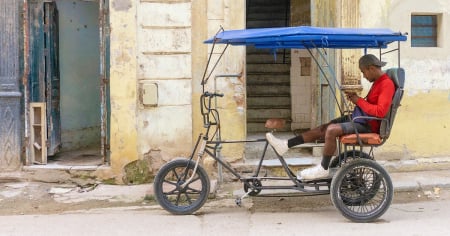The Telecommunications Company of Cuba (ETECSA) will increase internet rates starting in 2025 and will introduce new packages and services in foreign currency.
This was announced by the Prime Minister of the Cuban regime, Manuel Marrero Cruz, during a speech before the National Assembly of People's Power (ANPP) held this week in Havana.
Marrero explained that the measure aims to attract foreign currency, an urgent need given the severe economic crisis the country is experiencing.
According to the high-ranking Cuban official, since ETECSA introduced packages in national currency (MN), offers in dollars have lost popularity.
To reverse this trend, tariffs in local currency will be adjusted with a consumption limit.
"From that point on, anyone who wants to spend more will have to pay a different price," noted the Cuban Prime Minister, whose statements have sparked widespread backlash on social media.
New measures to attract foreign currency
Among the provisions anticipated by Marrero, the inclusion of roaming charges in foreign currencies stands out, along with the creation of new packages with additional services aimed at encouraging the influx of dollars into the country.
“A group of packages will be created to stimulate the inflow of foreign currency, with additional services that are currently not offered. All of this will help generate income,” he emphasized.
However, the prime minister did not provide details regarding the specific prices of the new packages or the exact date when these measures will be implemented.
Context of the economic crisis
During his speech, Marrero also assessed the results of the so-called "package", a set of economic measures aimed at addressing the crisis, which have not achieved the expected outcomes.
"We have the dissatisfaction that necessary progress has not been made, especially on those issues that our population demands," the official admitted.
The announcement of ETECSA's new rates and services comes in a context of economic hardship, characterized by a severe lack of liquidity and a decline in foreign currency revenues.
The state-owned company has been a key channel for attracting dollars through international top-ups for over a decade, a lucrative business that supports part of the national economy.
Statistics and Challenges of Internet Service in Cuba
Despite economic difficulties and the low quality of service, official figures indicate that the average monthly internet consumption in Cuba reaches 9.9 GB per user.
However, the high cost of the packages compared to the average income of the population remains a barrier for many Cubans.
With these new measures, the regime aims to reinforce ETECSA's ability to generate revenue in foreign currency in an attempt to alleviate the economic crisis, even though this may result in higher costs for users in a context of increasing hardship.
Is it the "cheapest" internet in the Caribbean?
In May of this year, amidst a context characterized by the rising inflationary process in the economy and the gradual devaluation of the Cuban peso (CUP), the telecommunications monopoly in Cuba, ETECSA, claimed that its internet service is the cheapest in the entire Caribbean.
According to Lidia Esther Hidalgo Rodríguez, the commercial vice president of the state-owned company, it was possible to support such a claim considering the parameters of the informal exchange rate: "One gigabyte of mobile data equals 0.17 dollars," she stated to the official newspaper Granma.
The mentioned "lower correlation throughout the Caribbean" is both laughable and controversial, considering that 88% of Cubans live below the poverty line and that the country's minimum wage is 2,100 CUP per month, roughly six dollars (according to the informal exchange rate), which is below the extreme poverty threshold defined by the World Bank: 2.15 dollars in total daily income.
With 7.8 million mobile users, of which 7.3 million have internet access as the only telecommunications company in the country, ETECSA offers 54,000 business services with an average bandwidth of 6 Mbps and is "working to create and improve technological platforms for electronic payments."
Frequently Asked Questions about the Increase in Internet Rates in Cuba
Why has the Cuban government decided to increase internet rates?
The Cuban government has decided to raise internet rates to attract more foreign currency in response to the severe economic crisis the country is facing. The goal is to adjust offerings in national currency (MN) and encourage the consumption of packages priced in foreign currency, which would generate more income in dollars, particularly from Cubans abroad.
What changes will ETECSA implement regarding internet packages?
ETECSA will introduce new internet packages and services priced in foreign currency, in addition to adjusting rates in national currency with a consumption limit. Users who wish to exceed this limit will need to pay additional fees in foreign currency as part of a strategy to attract more dollars to the country.
How has the population reacted to the announcements of the increase in internet tariffs?
The population has reacted with widespread discontent to the announcements of internet rate increases, expressing their dissatisfaction primarily on social media. The Cuban regime is facing criticism for creating an "economic apartheid" that affects those who can only pay in national currency, while privileging those with access to foreign currency.
What other economic measures is the Cuban government implementing to address the economic crisis?
In addition to increasing internet fees, the Cuban government has implemented measures such as accepting cash payments in dollars in strategic sectors and establishing tariffs in foreign currency for imports in the non-state sector. These measures aim to attract more foreign currency and control the partial dollarization of the economy, although they face challenges due to the informal currency market and the structural economic crisis.
Filed under:
